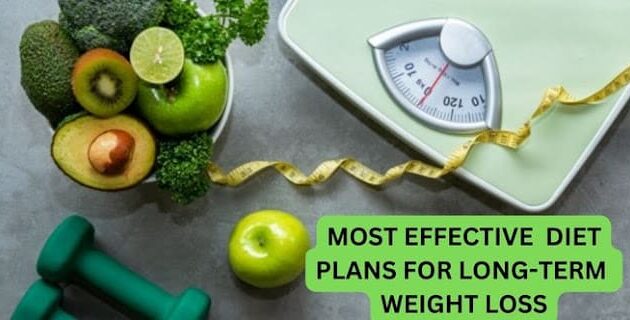Weight loss is a common goal for many people, but it can be challenging to achieve, especially if you need help figuring out where to start. While exercise is crucial in weight loss, diet is equally important. What and when you eat can significantly impact your weight loss journey. It is why it’s essential to find an effective diet plan that works for you.
Your diet plays a vital role in weight loss because it determines how many calories you consume daily. You will gain weight if you consume more calories than your body burns. Conversely, you will lose weight if you consume fewer calories than your body burns. It is why finding an effective diet plan is crucial for weight loss success.
While many quick-fix weight loss solutions are available, these approaches often result in short-term weight loss that could be more sustainable. To achieve long-term weight loss success, you must find an effective diet plan that you can stick to for the long haul. A diet plan that is easy to follow, nutritious, and fulfilling will increase your chances of success.
This article will discuss the top 5 most effective diet plans for long-term weight loss. We will also cover factors to consider when choosing a diet plan and tips for success in your weight loss journey. By the end of this article, you will better understand how to find an effective diet plan that works for you and how to achieve long-term weight loss success.
The Most Effective Diet Plans for Weight Loss
When it comes to weight loss, there are many diet plans to choose from. However, not all diet plans are created equal. Some are more effective than others and can help you achieve your weight loss goals faster. This section will introduce you to the top 5 most effective diet plans for weight loss.
Introduction to the Top 5 Most Effective Diet Plans
Each of the top 5 most effective diet plans we’ll be discussing has been proven to help individuals lose weight and improve their overall health. From Intermittent Fasting to the Keto Diet, we’ll cover everything you need to know about these diets and what makes them so effective.
Here are the most effective diet plans for weight loss:
1. Intermittent Fasting
Intermittent Fasting involves alternating periods of eating and fasting. This diet plan has improved insulin sensitivity, reduced inflammation, and increased weight loss.
2. Keto Diet
The Keto Diet is a low-carb, high-fat diet that forces your body to burn fat for energy instead of carbohydrates. This diet plan has been shown to help individuals lose weight, improve their mental clarity, and reduce the risk of chronic diseases.
3. Mediterranean Diet
The Mediterranean Diet is a plant-based diet that emphasizes whole grains, fruits, vegetables, and healthy fats. This diet plan has been shown to improve heart health, reduce the risk of chronic diseases, and aid in weight loss..
4. Low-Carb Diet
The Low-Carb Diet involves reducing carbohydrate intake and increasing protein and healthy fat intake. This diet plan has been shown to help individuals lose weight, improve insulin sensitivity, and reduce the risk of chronic diseases.
5. Plant-Based Diet
The Plant-Based Diet is a vegetarian or vegan diet that emphasizes whole, plant-based foods. This diet plan has been shown to improve heart health, reduce the risk of chronic diseases, and aid in weight loss.
Factors to Consider When Choosing a Diet Plan
When choosing a diet plan, it’s essential to consider several factors to ensure you find the right one.
1. Your Individual Weight Loss Goals
Your weight loss goals will play a significant role in determining which diet plan is right for you. Some diets are more effective for short-term weight loss, while others are better suited for long-term weight loss. Be sure to consider your individual goals and choose a diet plan that aligns with them.
2. Your Lifestyle and Habits
Your lifestyle and habits should also be considered when choosing a diet plan. Some diets are more restrictive and require a lot of preparation and planning, while others are more flexible and can be adapted to your lifestyle. Be sure to choose a diet plan that fits into your daily routine and is easy for you to stick to.
3. Your Personal Preferences and Health Conditions
Your personal preferences and health conditions should also be considered when choosing a diet plan. Some diets may not be suitable for individuals with certain health conditions, such as diabetes or heart disease. Additionally, some diets may need to align with your preferences, such as the foods you enjoy eating. Consider your health conditions and personal preferences when choosing a diet plan.
4. The Sustainability of the Diet Plan
Finally, it’s essential to consider the sustainability of the diet plan when choosing a diet plan. Some diets may not be sustainable in the long term, which can lead to yo-yo dieting and a lack of progress. Be sure to choose a sustainable diet plan that can be incorporated into your life long-term.
Choosing a diet plan that aligns with your weight loss goals, lifestyle and habits, personal preferences, and health conditions and is sustainable is critical to achieving long-term weight loss success.
Tips for Success in Long-Term Weight Loss with Diet Plans
So you’ve chosen the most effective diet plan for weight loss that aligns with your individual goals, lifestyle and habits, and health conditions, but how do you ensure success in the long term? Here are tips for success in long-term weight loss with diet plans:
1. Consistency and Patience
One of the critical elements to success in long-term weight loss with a diet plan is consistency and patience. Rapid weight loss may be tempting, but it’s important to remember that slow and steady progress is more sustainable in the long run. Stick to your diet plan consistently, even on weekends and during special occasions, and be patient as you work towards your weight loss goals.
2. Setting Realistic Goals
Setting realistic weight loss goals when starting a diet plan is also essential. Rapid weight loss is not sustainable and can lead to disappointment. Instead, aim to lose 1-2 pounds per week, which is a safe and achievable rate of weight loss.
3. Incorporating Physical Activity
Incorporating physical activity into your routine is another critical factor in long-term weight loss success. Physical activity not only helps to increase your caloric burn but also improves your overall health and well-being. Aim to engage in at least 30 minutes of moderate-intensity physical activity most days of the week.
4. Staying Hydrated
Staying hydrated is also crucial for success in long-term weight loss with a diet plan. Drinking enough water helps to regulate your appetite, improve digestion, and promote weight loss. Aim to drink at least 8 glasses of water per day and avoid sugary drinks that can add extra calories to your diet.
5. Avoiding Fad Diets
Finally, avoiding fad diets is essential when trying to lose weight. Fad diets often promote rapid weight loss but are not sustainable and can lead to yo-yo dieting and disappointment. Instead, choose a balanced and sustainable diet plan that you can stick to long term.
Success in long-term weight loss with a diet plan requires consistency, patience, realistic goal setting, incorporating physical activity, staying hydrated, and avoiding fad diets. Follow these tips, and you’ll be well on reaching your weight loss goals.
Conclusion
In conclusion, the most effective diet plan for weight loss is the one that aligns with your individual goals, lifestyle and habits, and health conditions. It’s important to consider all factors before choosing a diet plan and to stick to a balanced and sustainable diet that you can maintain long-term. Remember to set realistic goals, incorporate physical activity, stay hydrated, and avoid fad diets for the best chances of success.
Ultimately, the goal of weight loss is not just to lose but to maintain a healthy weight in the long term. Finding a sustainable and effective weight loss solution is crucial for long-term health and well-being. Choose a diet plan that works for you, and with consistency, patience, and the right tools, you can achieve your weight loss goals and maintain a healthy weight for life.


